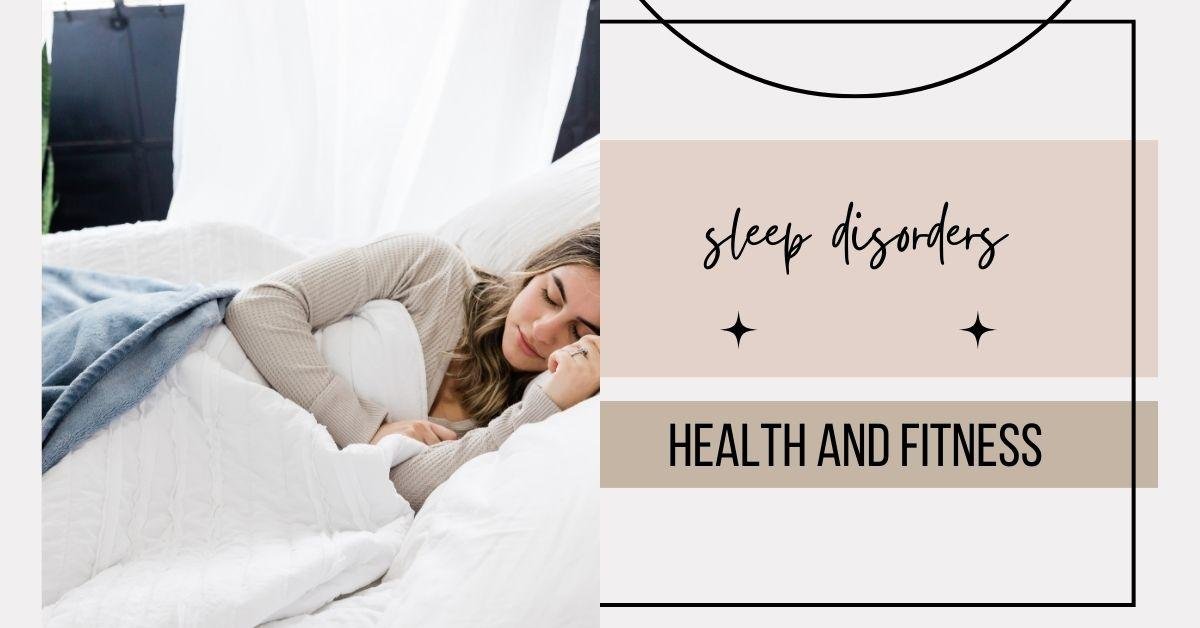Conditions known as sleep disorders impact the quantity, quality, and timing of your nightly sleep. Sleep apnea, narcolepsy, insomnia, and restless legs syndrome are common sleep disorders. Sleep disturbances may impact both your physical and mental health. You can receive treatment to help you obtain the rest you require.
Sleep disorders: what are they?
Sleep disorders are illnesses that interfere with your body’s capacity to receive the rest it needs and stay awake. More than 80 types of sleep disturbances affect:
The quality of your sleep.
The timing of when you fall asleep and if you can stay asleep.
The amount or duration of your sleep and wakefulness.
Everybody can occasionally have trouble falling asleep. However, you may be suffering from a sleep disorder if:
You have sleep disorders regularly.
Even though you slept for at least seven hours the night before, you still feel exhausted during the day.
It becomes challenging to carry out daily tasks.
Which sleep problems fall into which key categories?
Over time, there have been numerous changes to the classifications of sleep disorders. The International Classification of Sleep Disorders (ICSD) most recently divided sleep disorders into three categories: symptoms, pathophysiology (the way they affect a person), and the body system they affect. The following categories are included in the recently released third edition revision, ICSD-3R:
Having trouble falling and staying asleep is known as insomnia.
Breathing issues connected to sleep: When you sleep, your breathing alters.
Central hypersomnolence disorders: You struggle to stay awake during the day.
Circadian rhythm sleep-wake disorders: You have trouble falling asleep and waking up on time because of your internal clock.
Parasomnias: Verbal or physical behaviours, such as eating, talking, or walking, occur while you are asleep.
Movement disorders connected to sleep: The need to move or make physical movements during sleep makes it difficult to fall and/or stay asleep.
Which kinds of sleep disorders are there?
Sleep disorders come in more than 80 varieties. Among the most typical are:
For at least three months, you have struggled to fall or remain asleep most nights, which causes you to feel exhausted or agitated. This is known as chronic insomnia.
When you have obstructive sleep apnea, you snore and experience breathing pauses that interfere with your sleep.
When you have restless legs syndrome, you feel the need to move your legs.
When you have narcolepsy, you are unable to control when you go to sleep or how long you stay awake.
Shift work sleep disorders: Because of your job schedule, you have problems falling and staying asleep and experience unwelcome drowsiness.
You have trouble getting up in time for work or school because you fall asleep at least two hours later than you would like to. This is known as delayed sleep phase syndrome.
Acting out your dreams during the rapid eye movement (REM) period of sleep is known as REM sleep behavior disorder.
How much sleep is necessary for me?
Everyone needs to sleep. It plays a crucial role in how our bodies work. Experts advise adults to get seven to nine hours of sleep every night, though your needs may differ from others. Age-specific optimal sleep schedules vary; toddlers and teenagers, for instance, may require more sleep than adults.
What is the prevalence of sleep disorders?
In the US, around 50 million people suffer from sleep issues. Furthermore, it is reported that over 100 million Americans of all ages do not get enough sleep.
What signs of sleep disorders are present?
Depending on the nature, symptoms of common sleep problems can include:
Having trouble falling asleep or needing more than half an hour to doze off regularly.
You have difficulty falling asleep, or you frequently wake up in the middle of the night and are unable to get back to sleep.
During sleep, people may snore, gasp, or choke.
When you relax, you feel the need to move. This sensation is alleviated by movement. Having the sensation that you are immobile upon awakening.
Other indications and symptoms of inadequate sleep that you could encounter during the day include:
Daytime sleepiness: you frequently nap during the day or nod off while performing daily duties.
Alterations in behaviour, such as trouble concentrating or paying attention.
Alterations in mood, such as impatience and difficulty controlling your emotions.
Difficulty fulfilling performance standards or deadlines at work or school.
Why do people have trouble sleeping?
Sleep problems are brought on by an interference with your body’s natural sleep-wake cycle. This can happen for a variety of reasons, depending on the kind of sleep disturbance you have. They could consist of:
A sign of a disease, such as pain, asthma, heart disease, or a neurological disorder.
A sign of a mental illness such as anxiety disorder or depression.
Genetic elements (a mutation).
A pharmaceutical side effect.
Working the night shift.
Using drugs like alcohol or caffeine right before sleeping.
Low concentrations of specific minerals or substances in the brain.
An unidentified reason.
Which variables increase the likelihood of sleep disorders?
Sleep issues could be more likely to affect you if you:
Possess an underlying medical issue.
Feel pressured.
Put in late hours at work.
Have a biological family history of sleep problems.
According to research, sleep disturbances are more common in women and those assigned female at birth than in men and those assigned male at birth.
Furthermore, sleep disorders affect around half of all persons over 65.
If I do not get enough sleep, what will happen?
Beyond only making you feel exhausted during the day, your body may suffer if you do not receive the correct quantity or quality of sleep. Insufficient sleep can result in:
Learning, memory, or decision-making challenges.
Alterations in personality, such as irritability.
Reduced reaction times increase the likelihood of accidents.
How do sleep disorders get identified?
Following a physical examination to assess your symptoms and test results, a medical professional will make a sleep disorder diagnosis. Testing, such as imaging or blood testing, can help your doctor understand more about the cause of your symptoms.
You might be asked to maintain a sleep journal. Your sleeping patterns are documented in a sleep diary. Every day, you will record the times you go to bed, fall asleep, and wake up. Additionally, you should record your feelings both before and after sleeping, as well as any naps you take during the day. To assist you in remembering to write these things down, it is helpful to keep a pen and paper close to your bed.
Since it can be challenging to pinpoint the precise moment you go to sleep, you should make an educated guess. Consider wearing an actigraph or a smartwatch that tracks your cycles of activity and rest. This can verify when you went to sleep and when you woke up.
Your healthcare physician might advise you to see a sleep expert for a polysomnogram or sleep study. A sleep study is a test for sleep disorders that records and electronically transmits particular bodily and brain functions while you are asleep. To ascertain whether you have a sleep issue, a medical professional will examine the data from your sleep study.
Should I consult a sleep specialist?
If your doctor thinks you have a sleep condition, they recommend you see a sleep expert. A highly qualified medical professional who focuses on the effects of sleep on the body is known as a sleep specialist.
Handling and Therapy
What is the treatment for sleep disorders?
For a variety of sleep disorders, there are several therapy methods available, such as:
Altering your sleeping habits to encourage consistent sleep patterns and good sleep hygiene.
Cognitive behavioural treatment.
Using supplements (such as melatonin) or drugs (such as sleeping pills or alerting agents).
Altering prescriptions or dosages that result in extreme drowsiness (do not discontinue taking a drug until your doctor gives the go-ahead).
Either a neurostimulator or continuous positive airway pressure (CPAP) equipment to manage sleep apnea.
Light treatment.
Depending on your circumstances, your healthcare provider will suggest therapies. Before you start treatment, they will also go over any potential adverse effects.
Which drugs are used to treat sleep disorders?
To treat common sleep disorders, your healthcare professional might suggest some of the following drugs and supplements:
Melatonin, zolpidem, zaleplon, eszopiclone, ramelteon, suvorexant, lamborexant, or doxepin are examples of sleep aids for insomnia.
Medication for restless legs syndrome: Pregabalin, gabapentin, or gabapentin enacarbil.
Modafinil, armodafinil, pitolisant, mixed salt or sodium oxybate, and solriamfetol are examples of stimulants or wake-promoting drugs that can cause narcolepsy.
How can I sleep better?
To improve your quality of sleep, a medical professional could advise you to alter your sleeping habits. Making adjustments to your sleeping schedule to create the best possible sleeping environment is known as sleep hygiene. You can improve your sleep quality by:
Establishing a cosy sleeping space: Make sure your bedroom is dark, quiet, and cool. Try wearing earplugs or background noise, such as “white noise,” if the noise keeps you up. If light interferes with your sleep, consider a sleep mask or blackout curtains.

Reducing stress: Make an effort to feel less stressed before bed. Earlier in the evening, you might write things down, such as creating a to-do list. If you have a tendency to worry and overthink when you are in bed at night, this can assist. Avoiding negative thoughts before bed, like “How will I ever get through the day tomorrow if I do not get enough sleep tonight?” is also beneficial.
You should only use your bed for sleeping and having personal relationships. Avoid eating, working, or watching TV or videos on your phone in your bedroom.
Creating a consistent bedtime schedule: Establish routines before bed, such as reading, having a warm bath, or listening to relaxing music. Try meditation or relaxation techniques. Regardless of holidays or vacation days, get up at the same time every morning.
Ignoring the time: Use the alarm alone to wake up and flip the clock or turn your phone screen-side down. If you are unable to fall asleep within twenty minutes, get out of your bedroom. Read or do something soothing in a different room without using a screen.






